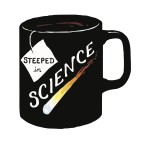 I loved this book, but it wasn’t what I thought it was going to be. I thought it would give some advice on how to sort through nonsense on the web, how to tell an authoritative source from a nonsensical one. Instead, the answer seems to be that Dr. Joe is an authoritative source, so we should just read his stuff.
I loved this book, but it wasn’t what I thought it was going to be. I thought it would give some advice on how to sort through nonsense on the web, how to tell an authoritative source from a nonsensical one. Instead, the answer seems to be that Dr. Joe is an authoritative source, so we should just read his stuff.
So all in all, the combination of the blurb and the approach of the book are a little, well, hubristic? off-putting? But that only shows up in the introduction, the blurb, and the conclusion. Between the intro and conclusion, there are many short articles on chemistry-related news items and rumors, setting the record straight. And Schwarcz’s voice is them is, for the most part, really very enjoyable. He gets rather snappish when Dr. Oz and the Food Babe come up, but when he’s talking chemistry, he just talks chemistry, and I really enjoy it. He doesn’t apologize for offending folks, though. If you’re a fan of homeopathy, acupressure, or, yes, Dr. Oz, you’re not gonna like his take on them. But he is consistently scientific, looking for evidence over conjecture.
The result is a set of short essays on most of the chemistry-related issues I’ve thought about over the last year or so. Okay, not all of them, but many of them that have come up in the news. The book is divided roughly into thirds: first, thoughts on food and nutrition, second, some basic chemistry and chemists (history), and third, medicine drugs, and various and other sundry topics. Including the Food Babe. Like most chemists I know, he resents that somehow “chemicals” have become villains in our culture, and often he asks what we would have left if we eliminated chemicals from our lives. Fair enough. He’s Canadian, so he often sites their Canada Health tests for the safety of food additives, or complains about their policies, which is a fresh break from FDA-bashing for me. Some of the articles focus on practical, useful things, like what sunscreen actually does, or that we should wash cantaloupes before cutting. Others are more random, but interesting and still chemistry related. A history of the German Bayer company, or stressing the early chemistry interest of Alan Turing (back off! he’s our computation guy, not a chemist!). The brevity of the pieces and the lack of any real link between successive pieces (except at the very end) makes it a little hard to read in long sessions, but as a short, informative, easy read, I recommend it.
I got a copy of the ebook from the publisher in exchange for an honest review.


Leave a Comment
You must be logged in to post a comment.